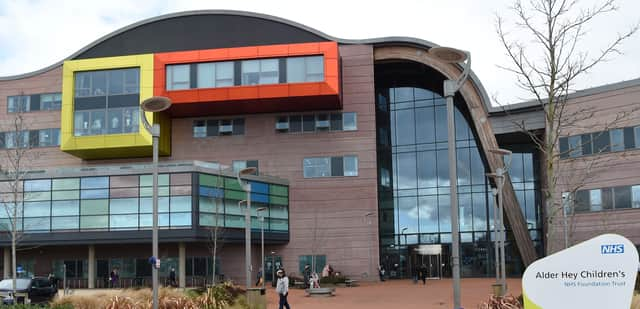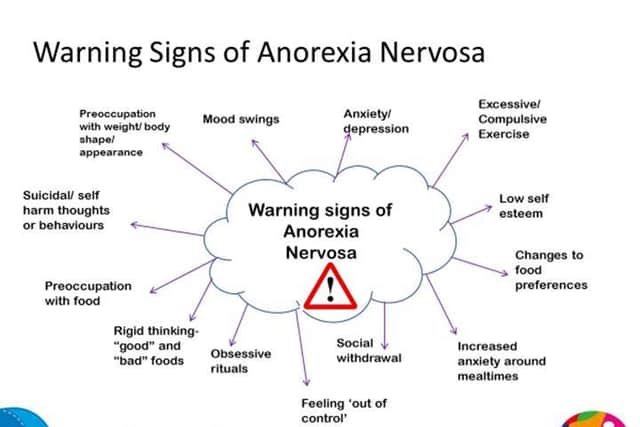Alder Hey eating disorders unit at full capacity as hundreds of children and teenagers treated during COVID


Children as young as ten have been treated for eating disorders at Alder Hey Children’s NHS Foundation Trust as cases have surged during the COVID-19 pandemic.
The hospital’s specialised unit has been running at full capacity with anxiety, stress and misinformation among the reasons for the increase in admissions of children and young people.
Advertisement
Hide AdAdvertisement
Hide AdAlder Hey’s Dr Vivienne Crosbie told LiverpoolWorld: “Due to the high number of referrals we see high risk referrals within seven days – but the wait if the young person is not high risk can be up to 40 days at present.
“During COVID-19 all the beds at our eight-bedded unit have been taken up. This is not normally the case, the children have ranged in age from ten upwards.”
The expert view
Dr Crosbie, Clinical Lead for Alder Hey’s Eating Disorder Young People’s Service (EDYS ) and Crisis Care Team, has worked at the Trust for 18 years.
She said that children and young people had been living in a “very different world” during the pandemic and had not been able to spend time with friends during lockdown which may have caused anxiety and stress.
Advertisement
Hide AdAdvertisement
Hide AdDr Crosbie, who is also a Consultant Clinical Psychologist at Alder Hey, added: “They may have also had increased anxiety around themselves or family and friends becoming ill.
“Anxiety might have made them feel sick and not eat, then they lose weight and go into starvation mode making it physically uncomfortable to eat.”
Loading....
Dr Crosbie explained that other reasons for the increase in eating disorders over the last 18 months may have included families struggling to afford the same foods as prior to the pandemic and increased stress in families and not being in school.
“There have also been public health messages that being overweight is a risk factor for worse COVID-19 symptoms and messages from media about healthy eating.
Advertisement
Hide AdAdvertisement
Hide Ad“This may have been taken out of context by some young people or taken to the extreme and foods that they see as ‘unhealthy’ getting cut out of their intake when it is important to have a balance of foods.
“They may have also been increasing exercise during pandemic in an attempt to fill or structure their time and then exercising too much.”
The facts and figures
NHS England data released last month shows 202 children and young people began treatment for eating disorders at Alder Hey Children’s NHS Foundation Trust between July 2020 and June 2021.
That was up from 153 over the same period a year earlier and the 123 seen in 2018-19, before the pandemic hit.
Advertisement
Hide AdAdvertisement
Hide AdOf the patients who began treatment last year, 35 had been the subject of urgent referrals, compared to 19 the year before and 12 in 2018-19.
NHS standards state 95% of urgent cases must begin treatment within a week, while routinely referred patients should be seen within four weeks.
The figures show Alder Hey Children’s Hospital saw 91% of urgently referred young people on time, while 71% of other patients started treatment within 28 days.
What is Alder Hey’s Eating Disorder Young People’s Service (EDYs)?
EDYs started in April 2016 and provides treatment to children and young people in Liverpool and Sefton with anorexia, bulimia and other eating disorders.
Advertisement
Hide AdAdvertisement
Hide AdIt is a dedicated community-based service which provides access to multi-disciplinary assessment and intervention to children and young people up to the age of 18.
The team is made up of a service lead, consultant psychiatrist, consultant paediatrician and clinical psychologist working alongside an array of staff including dieticians, nurses, a therapist and a support worker.
They provide care such as cognitive behavioural therapy, diet input and meal planning, physical reviews and family therapy. There are also home and community visits if necessary.
Information from the the eating disorders charity Beat, shows in children aged 12 and under, four out of five are afraid of being fat, with the charity aware of children as young as six having eating disorder treatment.
Advertisement
Hide AdAdvertisement
Hide AdAnorexia nervosa is the third most chronic condition in teenagers.


Research suggests that around 46% of anorexia patients fully recover, with 33% improving and 20% remaining chronically ill.
Dr Crosbie said the Alder Hey team helps parents and carers to develop skills they need to support their children. The Trust runs weekly groups for parents led by a family therapist and also has training sessions for professionals to access.
Department of Health reaction
A Department of Health and Social Care spokeswoman said eating disorders can have a devastating impact on sufferers and their families, adding that the Government is committed to ensuring young people in need of help get it.
Advertisement
Hide AdAdvertisement
Hide Ad"As part of our Mental Health Recovery Action Plan, we’re investing £79 million to expand children’s mental health services and opening up eating disorder services to an extra 2,000 young people.
“Early intervention and treatment is vital.”
NHS England’s mental health director Claire Murdoch said the pandemic had taken its toll on the country’s mental health, but that staff had responded rapidly to treat youngsters with eating disorders, with the aid of additional Government funding and the roll out of dedicated services across England.
Tom Quinn, Beat Director of External Affairs, warned it was essential that eating disorder services are equipped to cope with the increasing demand.
“We know that the pandemic has had a massive impact on people with eating disorders and their loved ones.
Advertisement
Hide AdAdvertisement
Hide Ad“At the pandemic’s peak, we experienced a 300% increase in people reaching out to our support services in comparison to pre-pandemic levels. We are continuing to provide expert advice and support for young people, adults and carers across the UK.
“We encourage anybody currently struggling to get in touch with their GP at the earliest opportunity.”
Comment Guidelines
National World encourages reader discussion on our stories. User feedback, insights and back-and-forth exchanges add a rich layer of context to reporting. Please review our Community Guidelines before commenting.